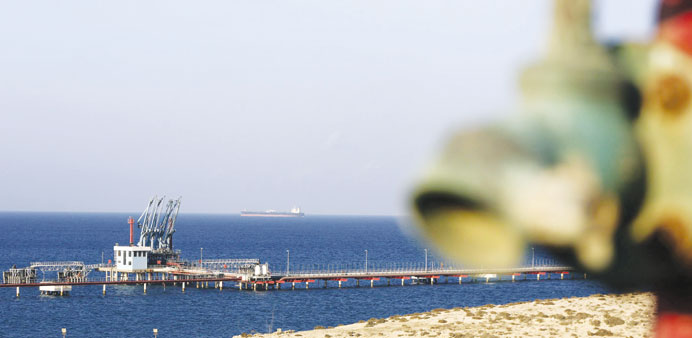A general view of the Hariqa oil port and loading installation in Tobruk, Libya. Large output gains in the US, amid potential recovery in Libyan and Iranian supplies, is set to weigh on global oil prices, Samba Financial has said.
Future oil prices seem set to drift below the current $100 or more for the Brent in the face of large output gains in the US and the potential recovery in Libyan and Iranian supply, Samba Financial Group has said in a report.
This will present fiscal challenges for some, although large external savings and low government debt levels provide substantial buffers, and policy adjustments are already underway in a number of countries, Samba said.
“GCC (Gulf Cooperation Council) economies continue to benefit from strong oil prices, which are holding at over $100/barrel for Brent,” said Samba in a report.
The economic recovery currently underway in advanced economies, particularly in the US, is prompting the US Federal Reserve to gradually wind down its quantitative easing programme, and to flag policy rate increases in 2015.
Given their US dollar exchange rate peg, GCC central banks will have to follow suit, while market funding costs have already started to rise.
GCC states have avoided the kind of financial market turmoil recently suffered by emerging markets. Robust macroeconomic fundamentals have ensured that market risk perception remains strong, and currency pegs are not under pressure.
Regional stock markets have been surging, bolstered to some extent by “safe haven” inflows.
Available data show that GCC economies continue to grow at a healthy rate, driven by strong performances in their non-oil sectors, including trade, transport and tourism, which are likely to benefit from the expected pick-up in global trade and growth.
According to Samba, robust public spending is supporting a large flow of project activity, and sound and well capitalised banks are providing credit, although rates of credit growth have moderated.
Oil output levels are beginning to ease off, and could do so further if Opec looks to manage supply in the face of weakening fundamentals. As a result, GCC hydrocarbon sectors are likely to make a smaller contribution to growth this year, which will dampen overall real GDP growth rates.
Real estate sectors in the GCC are undergoing a strong recovery from the large corrections seen in the wake of the global financial crisis. Price gains have been particularly rapid in Dubai, raising some concerns over the potential for another speculative bubble.

